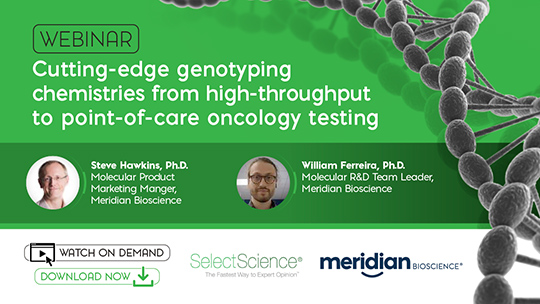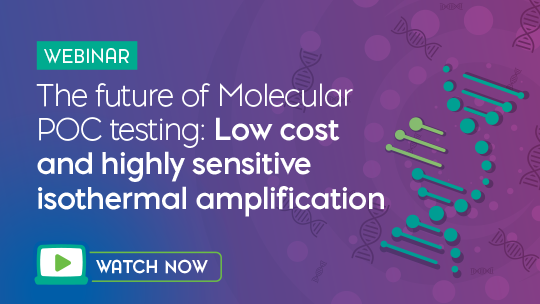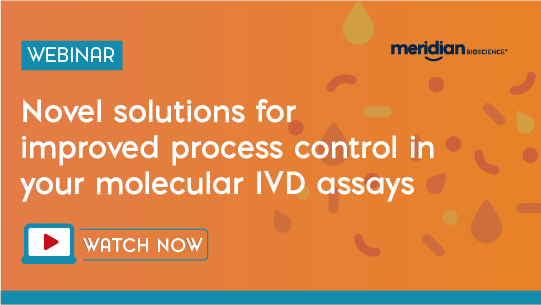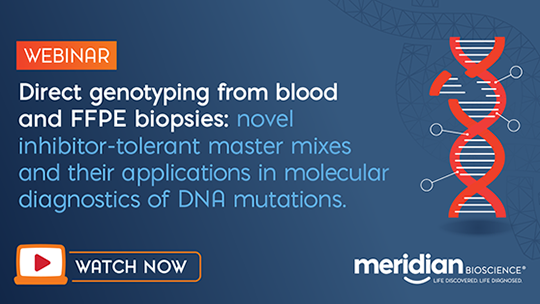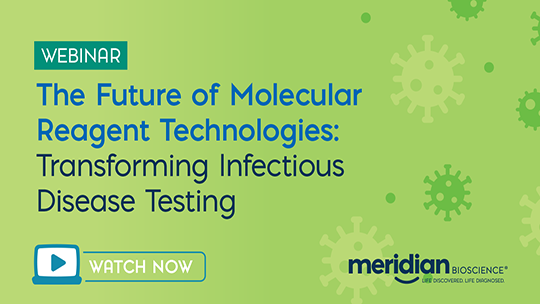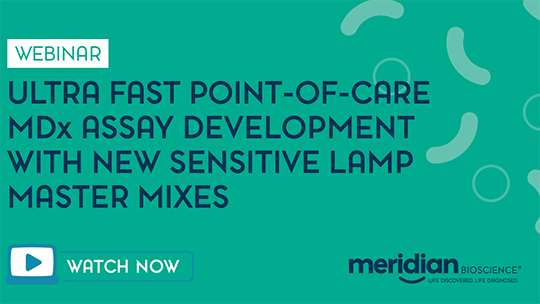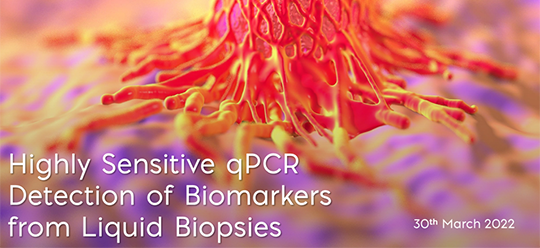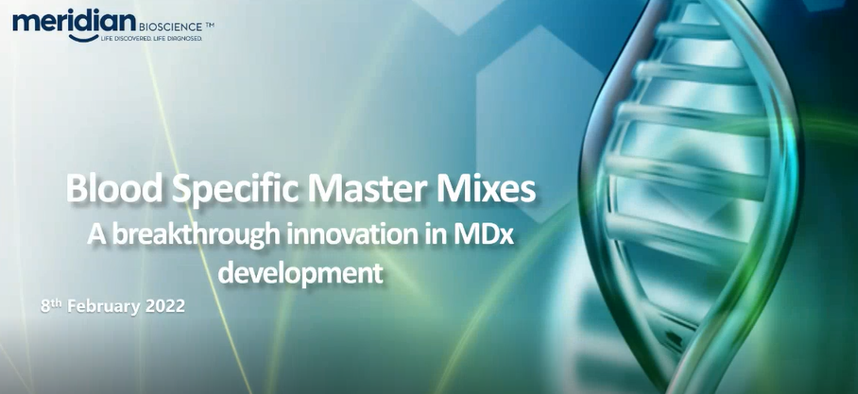Top Reasons for Using Animal-Free HAMA/RF Immunoassay Interference Blockers
Avoiding immunoassay interference requires blockers to be included in every immunoassay. Historically, animal-based interference blockers have been used to improve assay accuracy; however, they are susceptible to cross-reactivity with assay reagents, lot-to-lot variability, and supply shortages – as seen during the COVID-19 pandemic. Meridian’s new animal-free commercial blockers, K-BlockTM and Mouse-FREE IgG, are the next-generation solution for blocking HAMA/RF/HA that overcomes the ethical concerns and supply problems in using animal-derived blockers.
In this webinar you will learn the advantages of using animal-free immunoassay blockers and their performance.
Speakers:
Ryan Hughes Ph.D, (Life Science Immunology Product Manager, Meridian Bioscience)
Tatiana Chirkova, Ph.D, (Upstream Process Development Scientist, Meridian Bioscience)
Looking to detect SNPs or other point mutations in samples that have a limited number of DNA copies?
Join our in-house experts William Ferreira, Ph.D. and Steve Hawkins, Ph.D., for their latest webinar where they share their insights on the newest range of Lyo-Ready™ Genotyping Direct qPCR Master mixes that support commercial assays designed to detect mutations.
In this presentation, you will learn how to detect single nucleotide polymorphisms (SNPs) directly from blood, plasma, urine, stool or FFPE tissue (down to 1 copy/reaction) using a simplified workflow that eliminates the need for nucleic acid extraction.
Speakers:
William Ferreira, Ph.D., R&D Team Leader
Steve Hawkins, Ph.D., Product Marketing Manager
The Future of Molecular POC Testing: Low Cost and Highly-Sensitive Isothermal Amplification
The recent pandemic and increasing frequency of infectious disease outbreaks due to climate change, urbanization, and increased human migration have drawn significant attention to nucleic acid amplification-based diagnostic technologies (NAAT). Currently, these technologies are mainly accessible only to trained workers in centralized facilities. There is a growing demand for home-based, extraction-free testing using crude samples, however, there are significant challenges in assay development for these point-of-care (POC) applications.
In this upcoming webinar, you will learn:
- Advances in isothermal amplification as an alternative to the current qPCR gold standard
- Advantages of loop-mediated isothermal amplification (LAMP) and nucleic acid sequence-based amplification (NASBA) for the development of the next generation of sensitive, affordable, mobile POC devices
Speakers:
William Ferreira, Ph.D., R&D Team Leader
Steve Hawkins, Ph.D., Product Marketing Manager
Novel Solutions for Improved Process Control in Your Molecular IVD Assays
As the IVD industry continues to evolve, new regulations frequently come into place to better control an innovative and growing industry. Molecular IVDs in particular are experiencing tighter regulations regarding the presence of appropriate controls within the assay. All tests must include both positive and negative controls which are subjected to the whole testing process, including the extraction step. Novel co-extracted exogenous controls are providing cutting edge solutions for monitoring RNA or DNA analysis including the detection of potential inhibition. These controls can be used across a variety of sample types and assays, representing a significant advantage over traditional spike-in controls.
Speakers:
Michele Amasio, Ph.D. (Research and Development Senior Manager, Meridian Bioscience)
Moderator:
Steve Hawkins, PhD (Product Marketing Manager, Meridian Bioscience)
Direct Genotyping from Blood & FFPE Biopsies: Novel Inhibitor-Tolerant Master Mixes & Their Applications in Molecular Diagnosis
DNA genotyping is a powerful technology that allows the identification of genetic variations that can lead to an increased risk of developing certain diseases. Additionally, genotyping has a fundamental role in companion diagnostics, as it enables the characterization of patients’ genetic profiles that can be used to guide treatment decisions.
Here, we will introduce two novel master mixes developed to provide PCR-based identification of mutations directly from the clinical samples, such as blood, plasma or FFPE tissue, bypassing DNA extraction and streamlining the analysis of both liquid and tissue biopsies.
Speakers:
Mihai-Nicolae Podaru, PhD (R&D Senior Scientist, Meridian Bioscience)
Moderator:
Steve Hawkins, PhD (Product Marketing Manager, Meridian Bioscience)
Transforming Cancer Detection with Liquid Biopsy
Liquid biopsy is fast becoming the method of choice for cancer diagnosis in the field of precision medicine, allowing oncologists to choose a targeted therapy, monitor treatment resistance and detect minimal residual disease, without patients undergoing an invasive procedure. Liquid biopsy utilizes bodily fluids such as blood, stool, urine and saliva to detect cancer biomarkers earlier than conventional methods such as tissue biopsy. It is also useful to screen for drug-resistant subpopulations, micro-metastases, minimum residual disease and disease relapse. The non-invasive approach of liquid biopsies enables samples to be taken easily and repeatedly over the course of a patient’s treatment, overcoming the inherent shortcomings and risks of surgical tissue biopsies. This panel discussion will review how liquid biopsy is opening up new avenues in cancer detection and continuous monitoring for personalized cancer treatment, as well as the screening of cancer markers for therapeutic resistance. Four industrial leaders in the field of molecular diagnostics will come together to discuss the current status of liquid biopsy for cancer screening, as well as how modern technologies are changing the landscape of cancer detection and CDx.
Panelists:
Chris Sale (CEO, Nonacus, UK)
Shidong Jia, PhD (CEO, Predicine, USA)
Hongjun (Harry) Yang, PhD (Senior VP of CDx, DiaCarta, USA)
Florent Chang-Pi-Hin PhD (VP of R&D, Meridian Bioscience, USA)
Moderator:
Steve Hawkins, PhD (Product Marketing Manager, Meridian Bioscience)
The Future of Molecular Reagent Technologies: Transforming Infectious Disease Testing
The molecular diagnostic approach for infectious disease such as STDs, tropical, and respiratory disease has seen significant development in the past twelve months, driven by a demand for better, faster, higher sensitivity assays, that can detect asymptomatic carriers. Traditionally, lab-based tests using blood samples have been the mainstay for molecular testing, however home-based, extraction-free tests, using alternative sample types (saliva, urine, stool) are now highly sought after, but pose significant challenges in assay development for both lab-based and point of care (POC) applications.
In this webinar you will learn about:
- New nucleic acid amplification chemistries that simplify direct detection
- Optimizing assay performance per sample types (e.g. blood, saliva, urine, stool)
- The latest technologies that can reduce your cold-chain management
Presenters
Michele Amasio, Ph.D.
Research and Development Senior Manager
Steve Hawkins
Ph.D. – Product Marketing Manager
Ultra-fast Point-of-Care MDx development with new, sensitive LAMP master mixes
The COVID-19 pandemic accelerated the adoption of point-of-care molecular technologies that offer quick sample to results, high sensitivity, lower cost and widespread accessibility.
This webinar will cover new market-leading reagent solutions for loop-mediated isothermal amplification (LAMP) assays, which simplify assay development, speed up assay turnaround time, and deliver highly sensitive and specific amplification without DNA or RNA extraction.
Presenters
Elda Iljazi Ph.D.
Senior Scientist Meridian Bioscience
Highly sensitive qPCR detection of biomarkers from liquid biopsies
Liquid biopsy is a non-invasive alternative to tissue biopsy based on ultra-sensitive detection of tumor-derived material such as ctRNA and ctDNA from biofluids, including blood, urine, stool, saliva, and sputum. qPCR based liquid biopsy possesses several advantages in cost and throughput, when compared to other technologies like NGS and ddPCR. In this talk, we will discuss Meridian’s new advances in inhibitor tolerant qPCR based liquid biopsy, that reduces the cost and complexity of these assays, while enabling ultra-sensitive detection from very low concentration cancer markers.
Presenters
Steve Hawkins
Ph.D. – Product Marketing Manager
Michele Amasio, Ph.D.
Research and Development Senior Manager
Meridian’s solution to detecting DNA or RNA directly from whole blood
Direct qPCR has many advantages over traditional qPCR workflows that involve DNA/RNA extraction. However, achieving high sensitivity with direct qPCR using whole blood samples has been challenging due to the presence of qPCR inhibitors within the sample (such as heme, salts, and proteins), and preservatives or anti-coagulants that are added during the sample collection process. The inhibitors can negatively impact the performance of the enzymes used in qPCR and RT-qPCR and they limit the amount of sample that can be added to the reaction, overall reducing the assay sensitivity and accuracy. In this talk, we will be discussing Meridian’s novel solution to overcome PCR inhibitors in direct qPCR and RT-qPCR, enabling greater sensitivity for direct detection from whole blood, improving assay reproducibility, and reducing assay development time.
Presenters
Thomas Fouqueau, PhD
Acting Team Leader, R&D, Meridian Life Science
Rachel Currier, PhD
Acting Team Leader, R&D, Meridian Life Science

